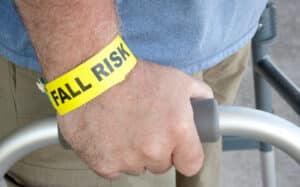For many elderly loved ones, as well as their caregivers, one of their biggest fears is falling and breaking a bone, especially a key one like a hip or a wrist. A bad bone break can take months to heal and make living independently nearly impossible for a while if not permanently. For a lot of people who have suffered a bad bone break, they look back and think “If only I hadn’t…” and wonder if they had made a safer, better choice, would the outcome have been different? Having a caregiver visit to provide companion care at home services, is a great way to make sure your loved one has someone with her when she needs help.
Prevention is the Best Solution

While some broken bones can’t be avoided, there are choices that you can help your loved one make to either reduce the risk of breaking a bone or reduce the risk that the injury sustained will not be too serious. Some prevention starts long before a fall ever occurs and others involve that split-second choice made before the fall. Let’s look at a few.
Preventing a Broken Bone Long Before the Injury
The best advice for preventing broken bones is to have strong bones. A person has their best bone mass around the age of 30 and then starts to lose more bone mass each day than the body creates. To balance out that decline in bone mass, eating a diet rich in calcium and vitamin D, as well as consistently exercising to build strength can help prevent a broken bone by providing those bones what they need to sustain a fall or hit.
Using Assistive Devices to Prevent a Broken Bone
If your loved one has balance issues, struggles with any ailments that make her dizzy, or has muscle weakness, remembering to always use her cane, walker, or other assistive device is a big step toward preventing a fall that could result in a bone break. Even if she doesn’t typically suffer from any conditions that may cause a fall, using hand railings whenever offered, leaning on furniture for support, and wearing proper shoes for the environment can all reduce the risk of a fall.
Turn on the Lights
Tripping often results from not seeing what is right in front of you on the floor. It could be an upturned corner of a rug or a black sock on a dark floor. Either of these is harder to see in low light. Remind your loved one to always turn on the hallway and staircase lights when using them so she can see what’s in front of her.
Don’t Climb Things
From standing on chairs to reach the towels on the top shelf of the linen closet, to using a step stool in the kitchen, these all pose of risk of stepping off incorrectly, twisting an ankle, and breaking a bone as your loved one hits the ground.
Reduce Risks with a Companion Care at Home Provider
A companion care at home provider can help her get out those Christmas ornaments in a box in the attic, or help her go for a walk down the block and navigate all of those cracks that make the ground uneven. Just having someone there with an elbow to hold onto can be the prevention your loved one needs.
If you or an aging loved one are considering Companion Care at Home Services in Whitehall PA, please contact the caring staff at Extended Family Care Allentown today. Call 610-432-6766
Extended Family Care Allentown is a Trusted Home Care Agency in Allentown, Pennsylvania including Bethlehem, Easton, Emmaus, Macungie, Whitehall, Schnecksville, Catasauqua, Northampton, and Nazareth.
- Celebrating Our Team – May Highlights - May 21, 2025
- How To Prepare Your Senior Parent For An Emergency - May 8, 2025
- Honoring Our Team: Birthdays, Anniversaries, and New Additions! - April 28, 2025

